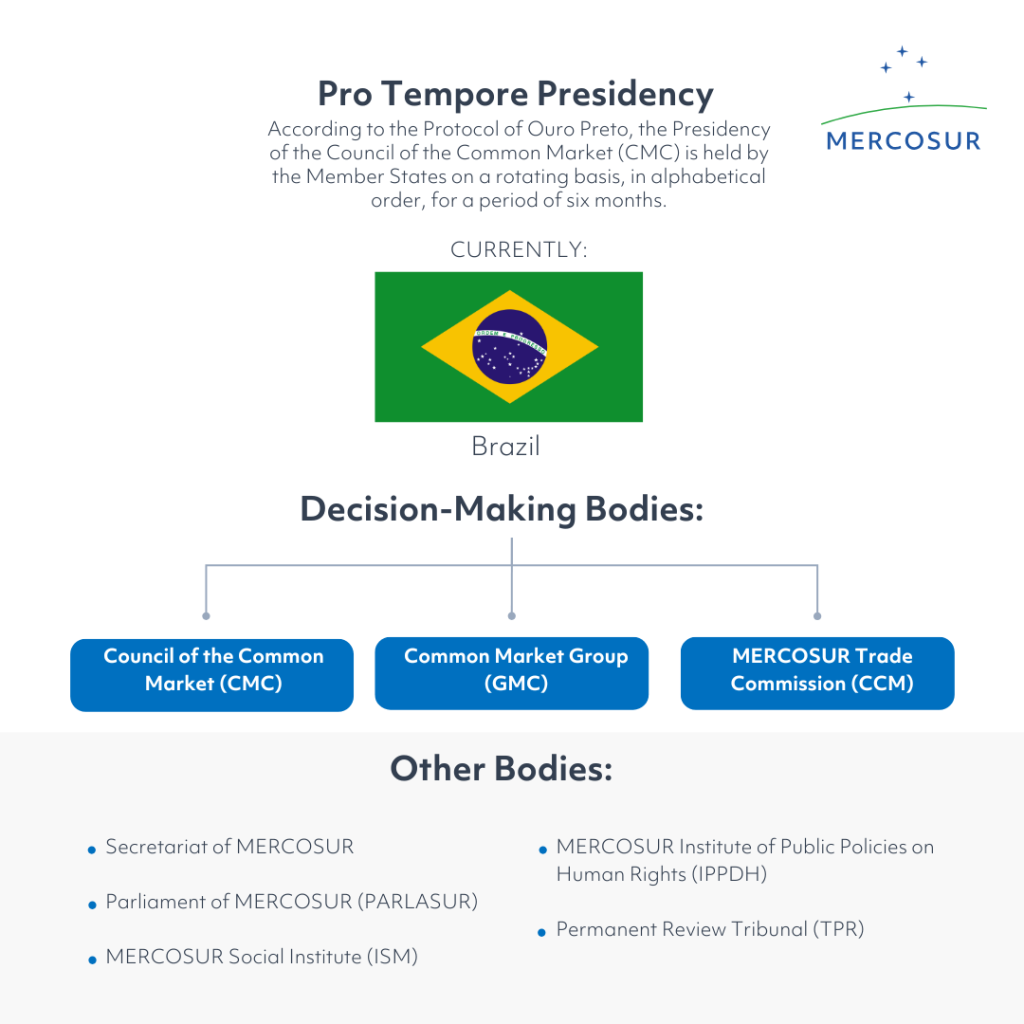Organizational chart

According to Article 1 of the Protocol of Ouro Preto on the Institutional Structure of MERCOSUR, the decision-making bodies of an intergovernmental nature within MERCOSUR are: the Council of the Common Market, the Common Market Group, and the MERCOSUR Trade Commission.
Council of the Common Market (CMC)
The Council of the Common Market (CMC) is the highest body of MERCOSUR. It is responsible for the political direction of the integration process and for making decisions to ensure the fulfilment of the objectives established by the Treaty of Asunción, and to achieve the final constitution of the common market.
The Council is composed of the Ministers of Foreign Affairs and the Ministers of Economy or their equivalents of the State Parties. It convenes as needed, and at least once every six months with the participation of the Presidents of the State Parties.
To fulfil its functions, the CMC is supported by subsidiary bodies or forums, including the Commission of Permanent Representatives of MERCOSUR, Ministerial Meetings, High-Level Groups, among others.
The CMC issues Decisions, which are binding on the State Parties.
Common Market Group (GMC)
The Common Market Group is the executive body of MERCOSUR. It is composed of four full members and four alternate members per country, appointed by their respective governments. Each delegation must include representatives from the Ministries of Foreign Affairs, the Ministries of Economy (or equivalents), and Central Banks.
The GMC meets on a regular or extraordinary basis. Regular meetings rotate among the State Parties and are held on mutually agreed dates, at least once every three months. Extraordinary meetings may be held at any time at the request of any State Party, at a location agreed upon by the members.
CMC Decision No. 24/14 established the current structure under the authority of the Common Market Group and the general criteria for the creation of future bodies under its scope. In this context, the GMC structure consists of the following categories of bodies: Working Groups, Working Sub-Groups, Ad Hoc Groups, and Specialized Meetings.
The Common Market Group issues Resolutions, which are binding on the State Parties.
MERCOSUR Trade Commission (CCM)
The MERCOSUR Trade Commission, which assists the Common Market Group, is responsible for ensuring the implementation of the common trade policy instruments agreed upon by the States Parties for the functioning of the customs union. It also monitors and reviews matters related to common trade policies, intra-MERCOSUR trade, and trade with third countries.
It is composed of four full members and four alternate members per States Parties and is coordinated by the Ministries of Foreign Affairs. It meets at least once a month or whenever requested by the Common Market Group or any of the State Parties.
To carry out its functions, the MERCOSUR Trade Commission is assisted by subsidiary bodies known as “Technical Committees”.
The CCM issues Directives, which are binding on the State Parties.



